Explore the enigmatic wonders of ancient Egypt encapsulated within the timeless Pyramid of Khafre. Discover its historical significance, innovative architecture, and the legacy of King Khafre through intricate chambers and towering structures.

| Overview | |
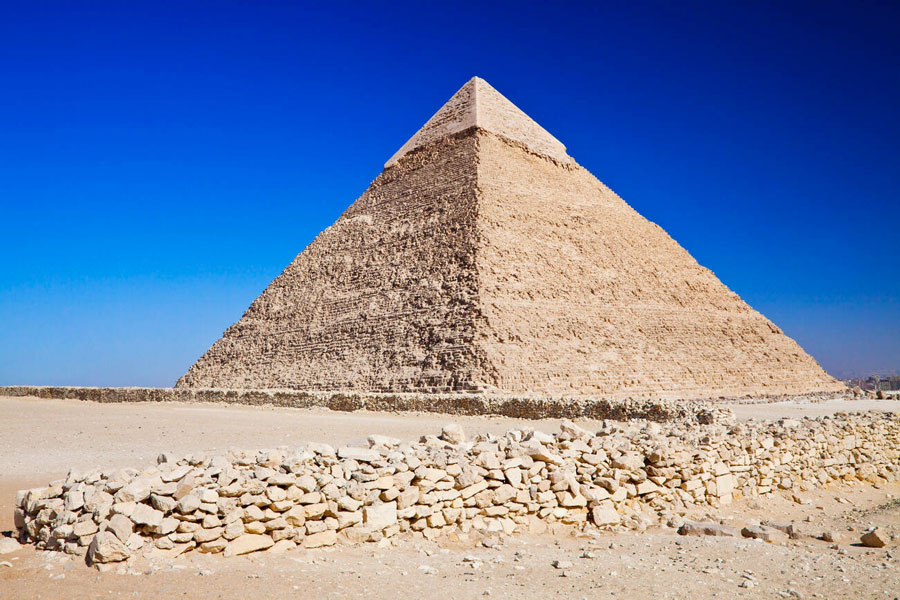
|
|
| Location | Giza Plateau, Egypt |
| Constructed | 2570 BC |
| Height | currently 136.4 m & originality 143.5 m |
| Base | 215.25 m |
| Volume | 2,211,096 cubic |
| Slope | 53°10' |
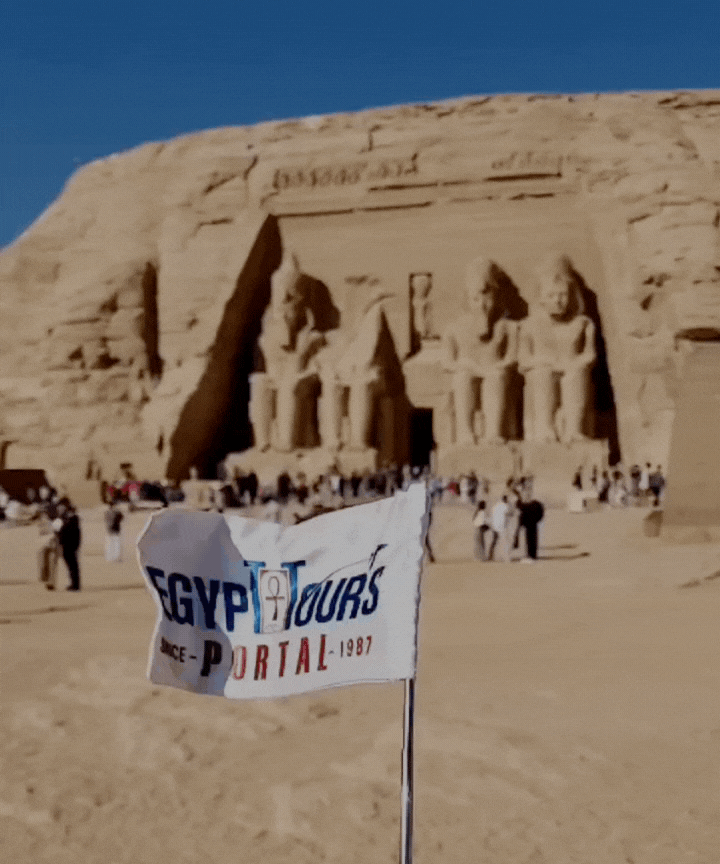
In the golden era of the old kingdom of ancient Egypt (2686-2181 BC), in the fourth dynasty (2613-2494 BC), three great pyramids were created to be the final resting place of the pharaohs and a true symbol of the greatness and brilliance of the ancient Egyptian civilization. The Pyramid of Khafre is an immortal milestone that rewrote the books of history to showcase the greatness of the 4th dynasty rulers of Egypt. The second pyramid was completed around 2570 BC, which earned the title of one of the biggest and most renowned wonders of the seven wonders of the ancient world. It conveyed many important facts about the politics, religion, environment, and social structure of Egypt during that time period.
The colossal pyramid is renowned for having the great sphinx in its magnificent presence, which has protected the Giza complex for ages. The pyramid gives an illusion of even being greater than usual due to its innovative and incredible architectural brilliance that stood the test of time.
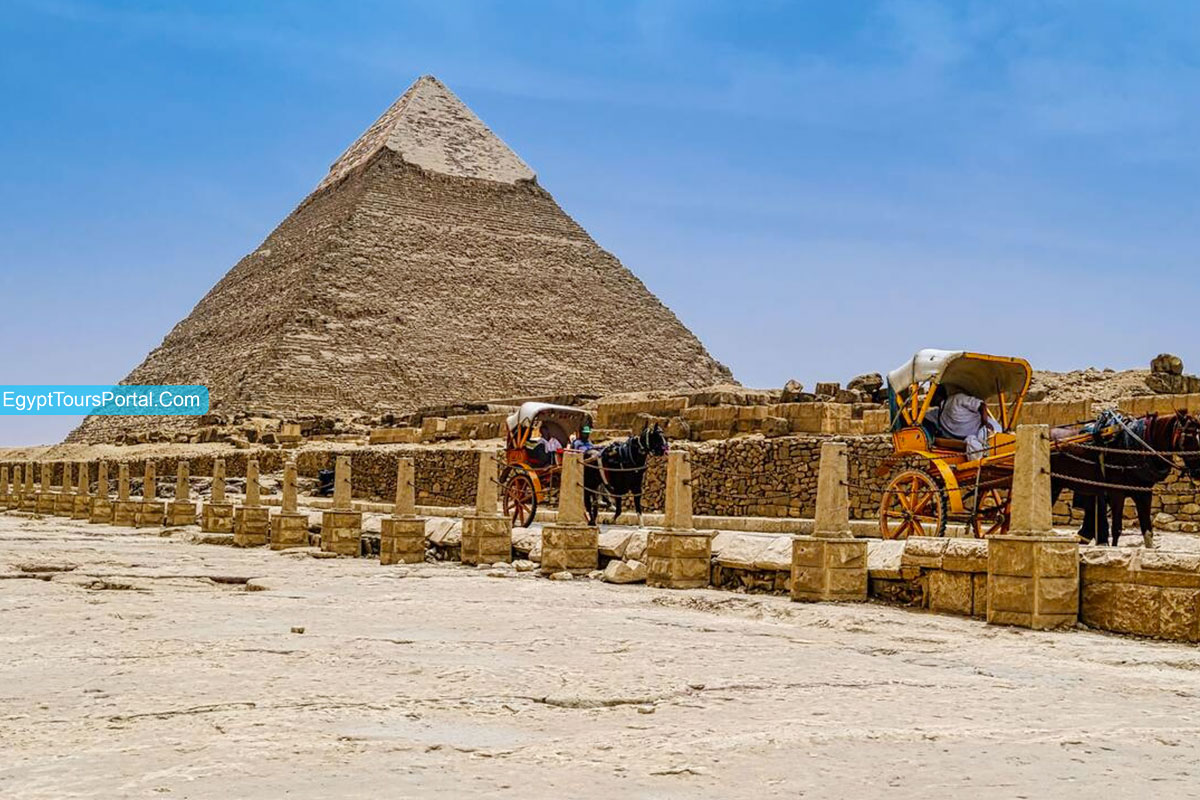
The Second Pyramid was established around 2570 BC, King Khafre also commissioned the Great Sphinx, a lion-bodied structure with a pharaoh's head. Over 400,000 workers labored for 20 years using basic tools to construct it. Nowadays, it would take around 2,000 workers using advanced machinery like stone-carrying vehicles and helicopters around five years to build a similar pyramid. Theories differ on who built it - some suggest skilled workers for wages or slaves for basic provisions. However, some believe it was the farmers who had idle time during flooding who contributed to its construction rather than slaves. The pyramid likely got looted during the First Intermediate Period.
Discover the rich history and the builder of the Great Pyramid of Giza, a marvel that is one of the world's seven wonders.
Read MoreIn the Nineteenth Dynasty, Ramesses II ordered the overseer of temple construction to use its stones for a temple in Heliopolis. In 1372 AD, an Arab historian noted the pyramid's opening, supported by Arabic writing found in its burial chamber around the same time. Giovanni Belzoni explored it in 1818, discovering the entrance on the north side but finding an empty chamber with an open sarcophagus. John Perring conducted the first full exploration in 1837, and later, Auguste Mariette uncovered Khafre's valley temple and a diorite statue of Khafre in 1858 while clearing the area.
The Pyramid of Khafre is located in Giza within the Giza pyramids. It's the second-largest pyramid at the Giza Necropolis, southwest beside the Great Pyramid of Giza (Pyramid of Khufu), which is the largest.
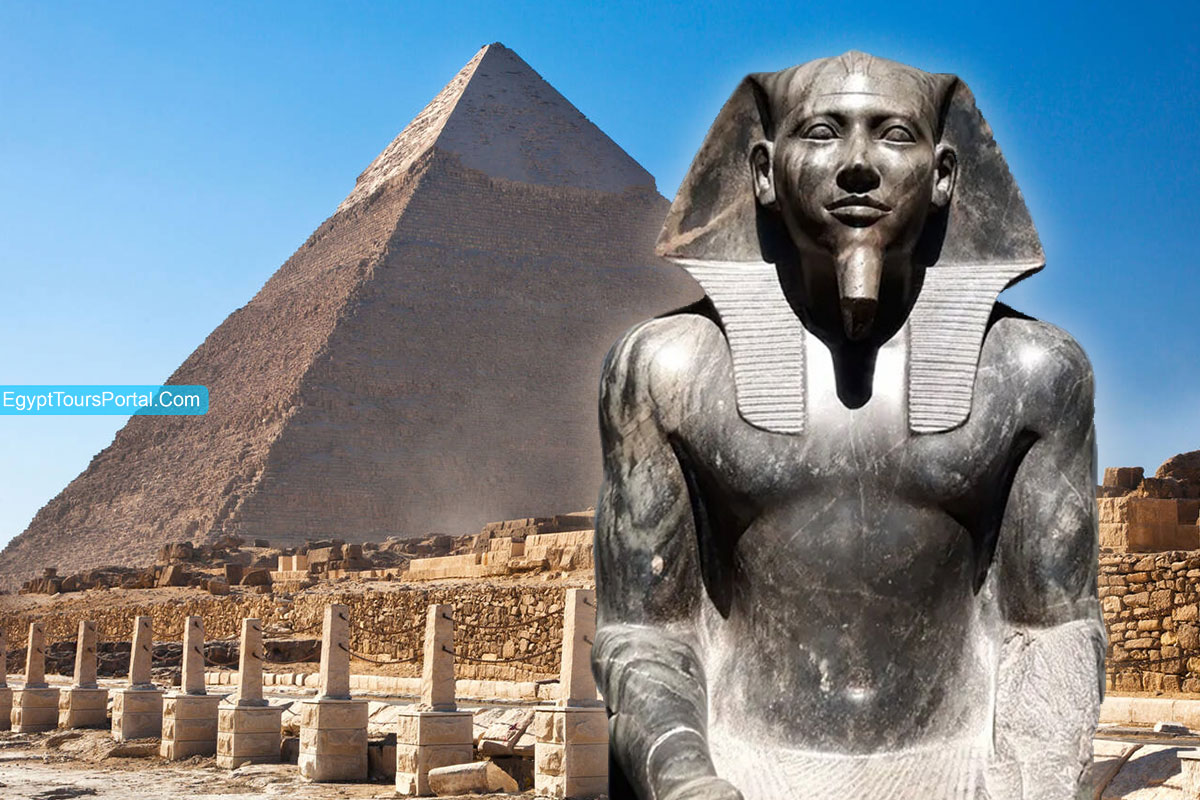
Khafre's legacy endures through his architectural marvels, but the details of his life remain somewhat shrouded in the mists of time, known to us through a mixture of historical records and archaeological findings. Khafre, who was known as Khephren or Chephren, was one of the ancient Egyptian pharaohs of the Fourth Dynasty during the Old Kingdom. He was the son of Khufu and succeeded Djedefre, who was also famous for building the second-largest pyramid at Giza and is widely believed to have commissioned the Great Sphinx of Giza around 2500 BC. The famous Greek historian Herodotus is a famous writer who lived centuries ago and provided us with everything we know about the pyramid. He was the son of Queen Meritites I, while others proposed Queen Henutsen as his mother.
He had multiple wives, notably Queen Meresankh III and Queen Khamerernebty I, among others, with whom he had numerous children, about 12 sons and 3 or 4 daughters. Some of his children include Nebemakhet, Duaenre, Niuserre, and Khentetka, among others. The reign is known to be between between 2558 BC and 2532 BC, Manetho's account exaggerates his rule to 66 years. Scholars generally agree on a reign lasting between 24 and 26 years, based on inscriptions like the Will of Prince Nekure, believed to be Khafre's son.
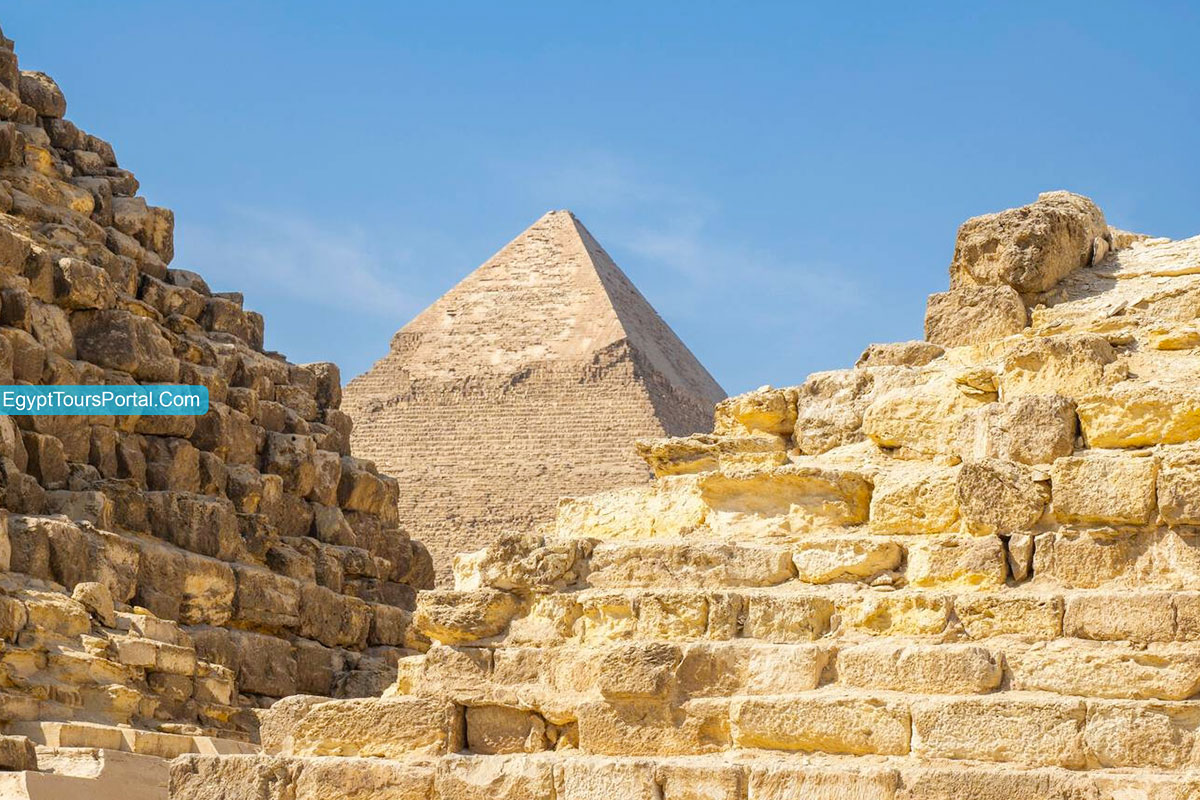
Khafre pyramid was constructed on horizontal courses; the stones would be larger at the very bottom, but as it rises, the stones would become smaller, only 50 cm thick at the apex. The courses are quite rough and irregular for the first half of their height, but a narrow band of regular masonry is very clear in the midsection of the Khafre pyramid.
The bedrock is fashioned into steps at the northwest corner of the Khafre pyramid. The bottom course of the casing stones is made of pink granite, but the remainder of the pyramid is cased in Tura limestone.
Close examination reveals that the corner edges of the remaining casing stones aren’t interlaid straight as they are staggered by a few millimeters, probably due to an earthquake, or they were shaped like this by the limited workforce.
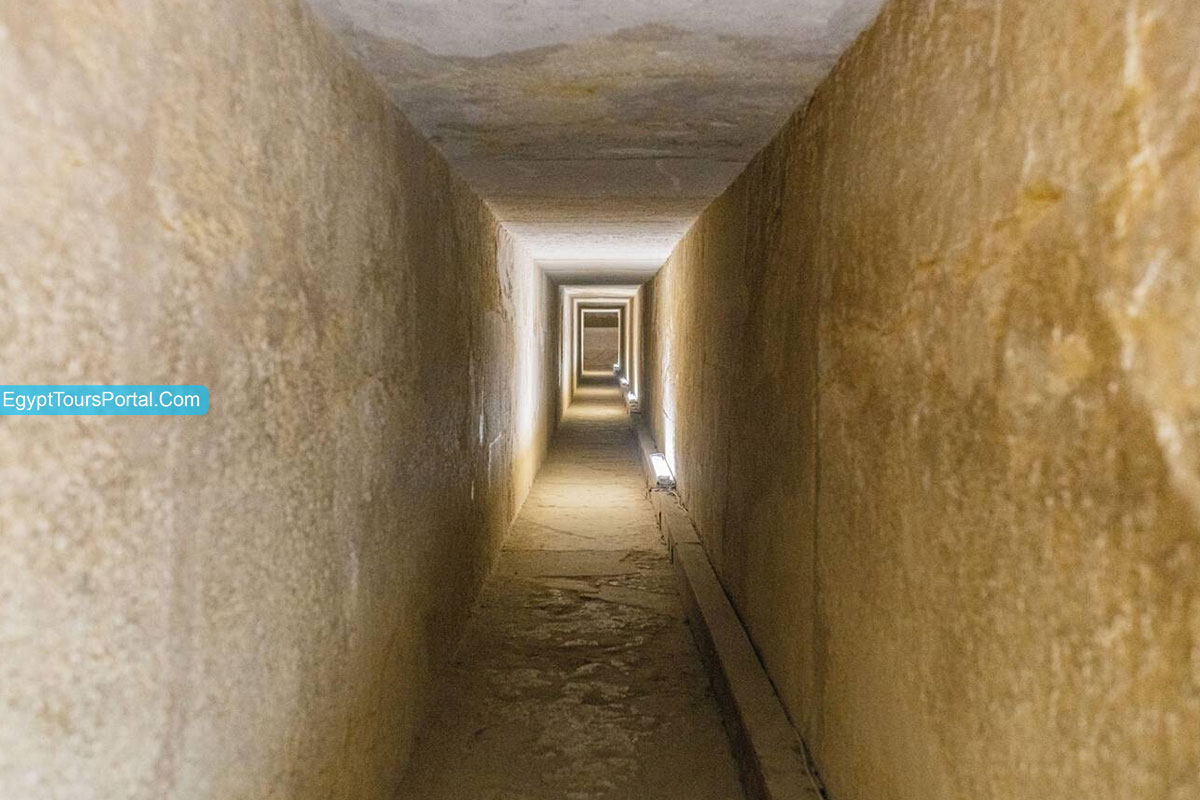
There are two entrances that lead to the internal structure of the pyramid of Khafre to the burial chamber. One of the entrances opens 11.54 m (38 ft) up the face of the pyramid, while one opens at the base of the pyramid of Khafre. The lower descending passageway is completely carved out of bedrock, running horizontally with a vertical portcullis, then ascending to join the horizontal passage leading to the burial chamber.
There is a subsidiary chamber that is equal in length to the Khufu's king chamber, it opens to the west of the lower passages, it is believed it was used to store offerings and burial equipment. The upper descending passage is clad in granite and descends to join with the horizontal passage straight to the burial chamber, which is carved out of a pit in the bedrock.
The roof is constructed of gabled limestone beams. The burial chamber is 14.2 m x 5 m (46.4 ft x 16 ft) and is oriented east-west. The sarcophagus of Pharaoh Khafre is carved out of a solid block of granite and sunk partially into the floor. There is also a storage place for the canopic jars.

The mortuary temple of the king's Khafre was the first of its kind as it concluded all the five elements, like an entrance hall, a court featuring a number of columns, five storage chambers, five niche statues of the pharaoh, and the inner sanctum.
It is constructed of huge limestone blocks clad with granite and an alabaster floor. The entrance leads to a narrow passage, and at the south end, there are two chambers in the north and a hallway with two columns that connect to four storerooms and a staircase leading to the roof.
There is a west wall of the hallway leading to a court with 14 square columns and wide bays at the north and south ends, followed by a hallway with ten columns that leads directly to the main court of the temple. The massive rectangular pillars formed the supports for a series of Khafre's statues.
There are five niches located on the western wall. To the north of the niches, there is a passage leading to the pyramid court, and to the south is a passage leading to a series of storerooms and a small exit. There are about 23 life-size statues of Khafre out of more than 50, which Ramses II removed and replaced with his own.
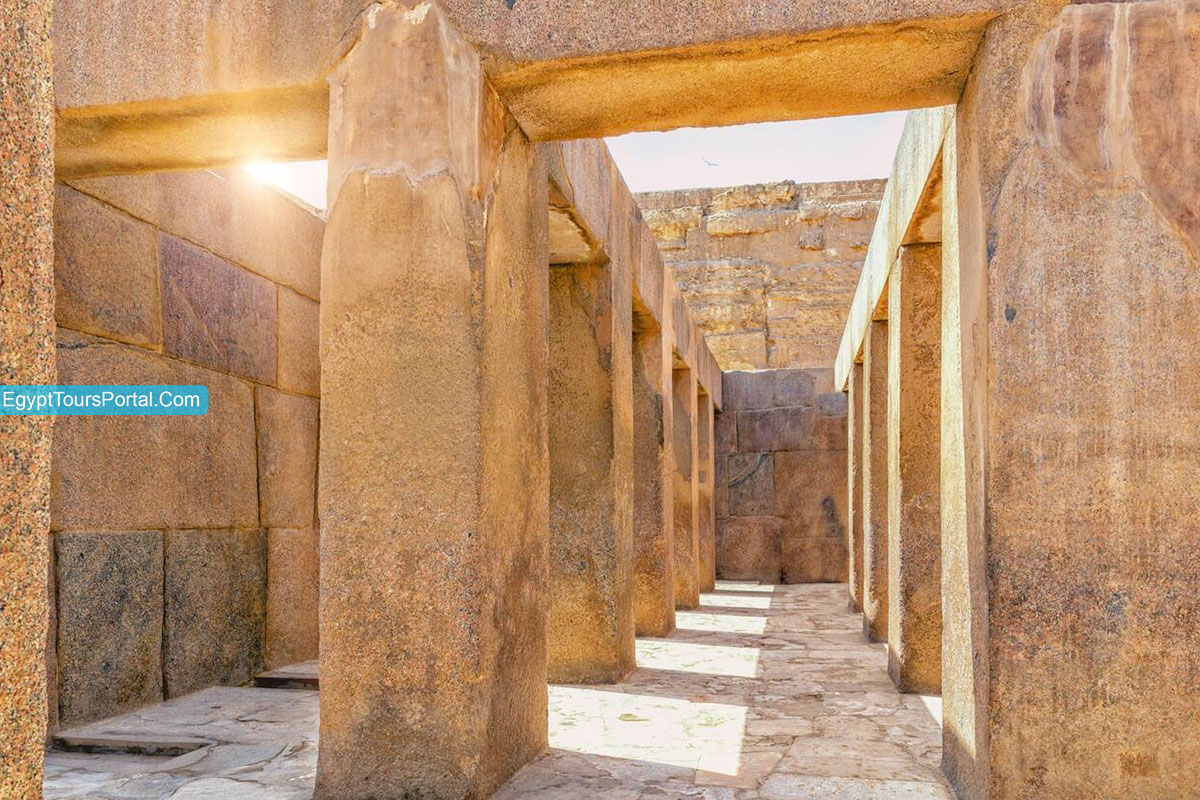
The Valley temple is famous for being the house of the mummification process in ancient Egypt. There is a causeway that runs 494.5 m (541 yds) to the valley temple. The interior is built out of huge blocks of red granite, while the exterior is made of limestone.
The square pillars of the T-shaped hallway were made of solid granite, and the floor was paved with alabaster. The exterior was constructed of huge blocks that weigh over 100 tons. There are two entrances in the eastern wall to a hallway that runs from north to south. There are two doors that open into a vestibule and a large pillared hall.
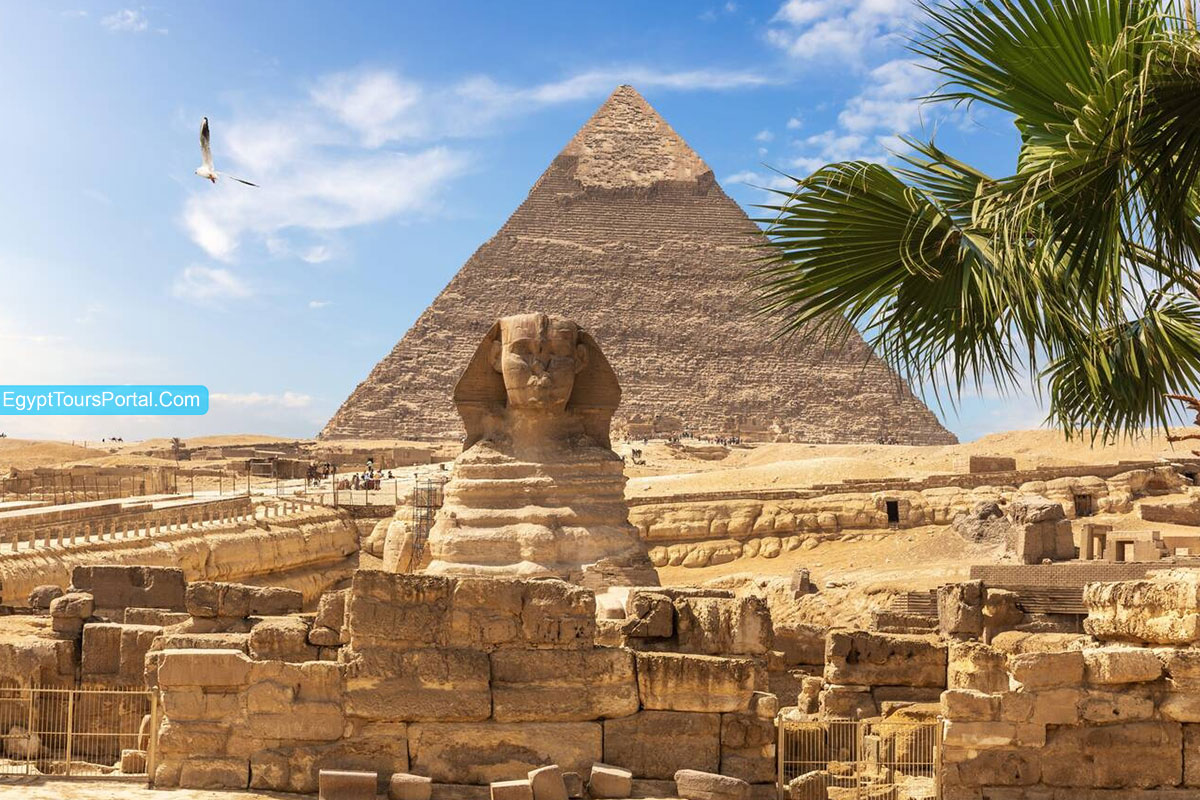
Egyptian pyramids were planned by skilled Architects and engineers who designed the structure, determining the pyramid's dimensions, orientation, and materials needed. The construction required a vast workforce, likely comprising skilled artisans, engineers, and a considerable number of laborers that was estimated to be tens of thousands of workers involved in building these monuments. Limestone blocks were quarried nearby and transported to the construction site. The stone blocks used for the core were large and heavy, while the casing stones were smoother and finer, thus creating a stunning & gleaming exterior that was taken off with time to create a number of construction projects in Cairo.
The construction began with laying the pyramid's foundation. Workers leveled the ground and created a base for the pyramid, then they built layer by layer, with workers stacking stones in a stepped formation. Each layer consisted of blocks placed on each other, which gradually decreased in size as they reached the top. There were various chambers, passageways, and burial chambers in the interior of the pyramid. These were constructed as the pyramid took shape, with passages designed to deter thieves. The outer casing stones were smooth and polished which were fitted precisely to create a smooth surface. A number of temples and causeways were constructed nearby for religious and ceremonial purposes.
Solved, how the Pyramids were built, explore the top information about this question, read more about the workforce, architecture, and more..
Read MoreThe precise methods used in pyramid construction remain a subject of study and debate among Egyptologists. The exact techniques employed in moving and lifting the massive stone blocks without modern machinery continue to fascinate and challenge researchers, but the majority of scholars believe it comes down to two theories which are:
1. The Ramp Theory is one of the most widely accepted explanations for how the ancient Egyptians constructed the Pyramid of Khafre. Scholars propose that they reduced friction by dragging stones on wet sands, making the process more manageable. The stones were hauled individually to the top, considering their weight.
2. The second theory, "The Water Shaft Theory" suggests the use of wooden boats in a canal to transport the stones, but neither theory has been conclusively proven.
Both ideas highlight the immense challenge of moving around 4.88 million tons of stone from east to west, which emphasizes the astonishing achievement of ancient Egyptians, who accomplished this feat using rudimentary tools. The lack of definitive evidence underscores that these methods remain theories, leaving the mystery of the pyramid's construction largely unsolved.

The pyramid acted as the final resting place for Pharaoh Khafre, who chose the west for his pyramid, believing it was where the sun "Died" each night. The pyramid held significant religious importance and intended to secure his deified status in the afterlife. This choice of location signified his belief in a continued existence after death, prompting him to store treasures like gold, pottery, clothes, and jewelry for his use in the next life. There's a theory linking the site's selection to the pyramid's weight, suggesting Khafre chose this spot to ensure stability, supported by the collapse of the Meidum pyramid over time.
The Pyramid of Khafre serves as a daily reminder worldwide of his enduring reverence for life beyond death, which was deeply rooted in his spiritual beliefs. The valley temple was built to be the center for the mummification of the king, while the sphinx was carved to carry his face, which protected his pyramid and the entire complex till the end of times.
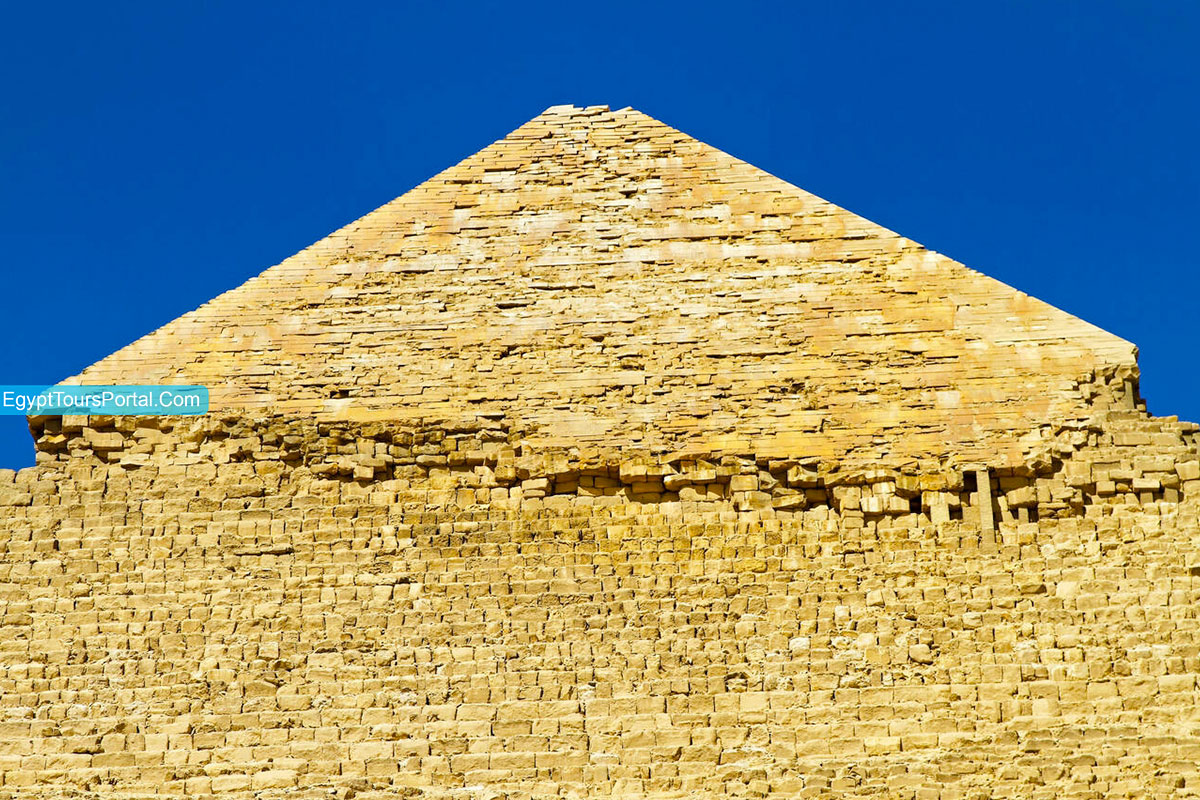
One of the most incredible features of the Khafre pyramid is the top, which possesses a unique look that provides a glimpse of the possibility that the pyramid was entirely complete and cased with white limestone. The Khafre pyramid would have been topped with a capstone or pyramidion made of gleaming white Tura limestone, reflecting the sun's rays and making the structure highly visible from afar.
The third of the pyramid within the top is covered with casing stones, plus the entire pyramidion and the apex are completely missing, likely removed or destroyed over the centuries.
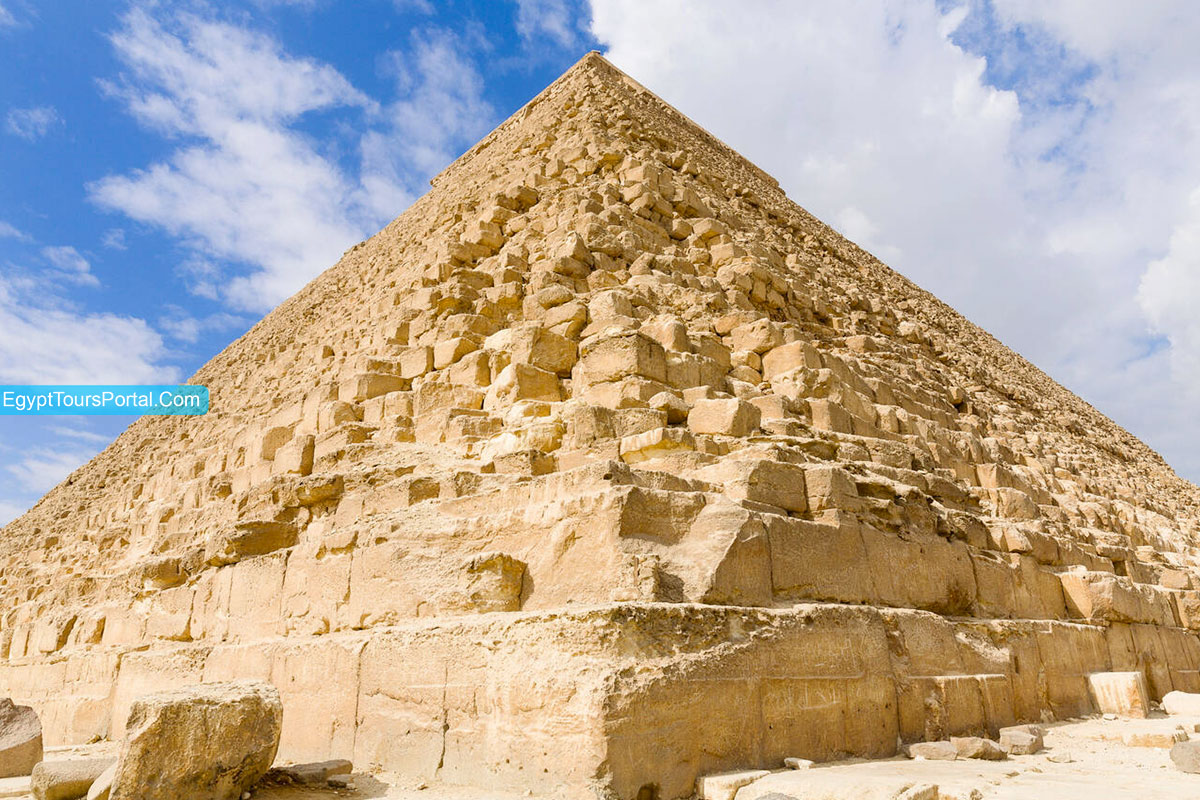
There is nothing in the world that could match the beauty and greatness of the pyramids, so if you find yourself in Egypt, don't miss the chance to explore this immortal miracle through Giza Pyramids tours.
Private 4 Days Cairo Tour Packages for South African Travelers 4 days Cairo Egypt To...
Tour Location: Cairo – Giza...
5 Days Cairo and Alexandria Tour Package For South African Travelers 5 days Cairo an...
Tour Location: Cairo/Giza/Alexandria...
6 Days Cairo, Luxor & Aswan Tour Package For South African Travelers 6 days Cair...
Tour Location: Cairo/Giza/Aswan/Luxor...
Amazing 7 Days Cairo and Hurghada Holiday for South African Travelers 7 Days Cairo &...
Tour Location: Cairo – Giza – Hurgh...
The Pyramid of Khafre, which is also known as the Pyramid of Chephren, was built in 2570 BC during the Fourth Dynasty of the Old Kingdom of Egypt.
It stands at around 136.4 meters (448 ft) tall, although its original height at the time of construction was 143.5 m (471 ft; 274 cu).
Pharaoh Khafre (2575 – 2465 BC), during the Fourth Dynasty, commissioned the construction of this pyramid.
The most unique aspect of the Khafre Pyramid is the original stone casing stone found at its highest climax, which showcases the epic legacy of Khafre plus how the ancient Egyptians created the Giza Pyramid.
The Khafre Pyramid has the pharaoh’s tomb, which is able to shed light on the funerary and mythical beliefs of the ancient Egyptians about the afterlife and their elaborate burial practices. The pyramid is aligned and positioned with epic structures in the Giza complex, which highlights astronomical significance in ancient Egyptian cosmology.
The Khafre Pyramid was damaged over the centuries because of the removal of its outer stones, but it stands as one of the most well-preserved pyramids in all of Egypt.
The Khafre Pyramid is known to appear taller than the Great Pyramid of Giza, which was created on higher ground and is known to sit on a bedrock foundation, which provides the illusion of an even greater height when viewed from certain angles.
Everyone can enter the Khafre Pyramid where everyone can witness the wonders found within.
The entire country of Egypt deserve to be explored with its every heavenly detail but there are places that must be seen before any other such as the breathtaking Hurghada's red sea, The wonders of Cairo the pyramids of Giza, the great sphinx, the Egyptian Museum, Khan El Khalili Bazaar, the wonders of Luxor like Valley of the Kings, Karnak & Hatshepsut temple and the wonders of Aswan such as Abu Simbel temples, Philea temple, Unfinished obelisk and The Wonders of Alexandria like Qaitbat Citadel, Pompey's Pillar and Alexandria Library. Read more about the best places to visit in Egypt.
If you want to apply for a Visa On Arrival that lasts for 30 days then you should be one of the eligible countries, have a valid passport with at least 6 months remaining and pay 25$ USD in cash, as for the E-Visa for 30 day you should have a valid passport for at least 8 months, complete the online application, pay the e-visa fee then print the e-visa to later be presented to the airport border guard. You could also be one of the lucky ones who can obtain a free visa for 90 days. Read more about Egypt travel visa.
Egypt has a variety of delicious cuisines but we recommend “Ful & Ta’meya (Fava Beans and Falafel)”, Mulukhiya, “Koshary”, a traditional Egyptian pasta dish, and Kebab & Kofta, the Egyptian traditional meat dish.
The best time to travel to Egypt is during the winter from September to April as the climate becomes a little tropical accompanied by a magical atmosphere of warm weather with a winter breeze. You will be notified in the week of your trip if the Climate is unsafe and if any changes have been made.
You should pack everything you could ever need in a small bag so you could move easily between your destinations.
We have been creating the finest vacations for more than 20 years around the most majestic destinations in Egypt. Our staff consists of the best operators, guides and drivers who dedicate all of their time & effort to make you have the perfect vacation. All of our tours are customized by Travel, Financial & Time consultants to fit your every possible need during your vacation. It doesn't go without saying that your safety and comfort are our main priority and all of our resources will be directed to provide the finest atmosphere until you return home.
You will feel safe in Egypt as the current atmosphere of the country is quite peaceful after the government took powerful measures like restructuring the entire tourist police to include all the important and tourist attractions in Egypt. Read more about is it safe to travel to Egypt.
Wear whatever feels right and comfortable. It is advised to wear something light and comfortable footwear like a closed-toe shoe to sustain the terrain of Egypt. Put on sun block during your time in Egypt in the summer to protect yourself from the sun.
The best activity is by far boarding a Nile Cruise between Luxor and Aswan or Vise Versa. Witness the beauty of Egypt from a hot balloon or a plane and try all the delicious Egyptian cuisines and drinks plus shopping in old Cairo. Explore the allure and wonders of the red sea in the magical city resorts of Egypt like Hurghada and many more by diving and snorkeling in the marine life or Hurghada. Behold the mesmerizing western desert by a safari trip under the heavenly Egyptian skies.
There are a lot of public holidays in Egypt too many to count either religious or nation, the most important festivals are the holy month of Ramadan which ends with Eid Al Fitr, Christmas and new years eve. Read more about festivals & publich holidays in Egypt.
Egypt is considered to be one of the most liberal Islamic countries but it has become a little bit conservative in the last couple of decades so it is advised to avoid showing your chest, shoulders or legs below the knees.
Arabic is the official language and Most Egyptians, who live in the cities, speak or understand English or at least some English words or phrases. Fewer Egyptians can speak French, Italian, Spanish, and German. Professional tour guides, who work in the tourism sector, are equipped to handle visitors who cannot speak Arabic and they will speak enough English and other languages to fulfill the needs of all our clients.
The fastest way is a car, of course, a taxi. If you are in Cairo ride a white taxi to move faster or you could board the fastest way of transportation in Egypt metro if the roads are in rush hour.
The temperature in Egypt ranges from 37c to 14 c. Summer in Egypt is somehow hot but sometimes it becomes cold at night and winter is cool and mild. The average of low temperatures vary from 9.5 °C in the wintertime to 23 °C in the summertime and the average high temperatures vary from 17 °C in the wintertime to 32 °C in the summertime. The temperature is moderate all along the coasts.
It is the home of everything a traveler might be looking for from amazing historical sites dating to more than 4000 years to enchanting city resorts & beaches. You will live the vacation you deserve as Egypt has everything you could possibly imagine.









